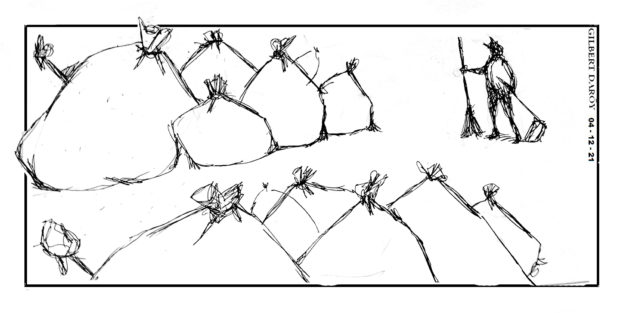
Editorial cartoon
Gen. Guillermo Eleazar had some fighting words for his troops on his first day as the new chief of the 220,000-strong Philippine National Police: “Sa mga natitirang hoodlum in police uniforms, sisiguraduin ko sa inyo, you will hate me. Hindi ako magdadalawang-isip na magtanggal ng mga tiwaling pulis.”
The newly installed top cop — the sixth under the Duterte administration — also said that the padrino or palakasan system — where promotion or recruitment into the PNP is decided by family connections or friends in high places and not merit — will have no place while he’s at the helm of the PNP. And he committed to the Filipino people that he would not be involved in any corrupt activities and lead the vital public institution by example: “I assure our kababayan that for as long as I’m the chief PNP, every single centavo of your hard-earned money allocated to us will be in good hands.”
These sweet-sounding promises are part of Eleazar’s “Intensified Cleanliness Policy” for the force, which goes from ordering policemen to literally keep precincts and police stations tidy and presentable to gain the public’s trust, to bringing the police closer to the communities they serve. All these, with the unstated goal of regaining respect and stature for an institution that has been much tainted by criminal behavior, rights violations, and widespread corruption.
It’s a tall order Eleazar has set for himself, especially since he follows in the wake of one Debold Sinas. Former PNP chief Sinas, also a member of the Philippine Military Academy Hinirang Class of 1987 but who got promoted ahead of Eleazar, has barely warmed his retirement rocking chair, as it were, and already the Palace has assured him, through Interior Secretary Eduardo Año, that President Duterte would be giving him a new, as yet unspecified job. What a lucky guyʍa presidential favorite through and through, even after the string of ugly controversies that had marred his name and the organization he presided over.
Sinas left behind a deplorable messʍnot only the “mañanita” violation last year at the height of the quarantine restrictions for which he became infamous, but, more egregiously, a record of brutal counter-insurgency drives, widespread arrests of activists on the back of spurious charges that were successively struck down by the courts, and the appalling release of nine Sulu policemen charged with the murder of four military intelligence officials in June last year despite a Department of Justice (DOJ) manifestation that their (slightly delayed) arrest warrants were on the way. Those policemen remain fugitives to this day, their flight from justice and the enormous cost of hunting them down all plainly courtesy of Sinas.
With Eleazar a mere six months away from his own retirement on Nov. 13, he can make good on his promises by making a clean break from the policies and methods of his predecessor.
For a start, he should order a no-nonsense manhunt for the nine Jolo cops who vanished, to repudiate the casual disregard for the law that his predecessor had displayed when it came to brothers in uniform.
Next, he can heed the call of legislators to finally start the long overdue rollout of body-worn cameras in police operations as a deterrent to abuse and misbehavior. As House of Representatives deputy speaker Bernadette Herrera-Dy stressed, the “mandatory wearing of body cameras by police officers can somehow regain the trust of Filipinos in the police force.” The Supreme Court had already ordered police officers as early as March to wear body cameras when serving arrest and search warrants, but the PNP has been dilly-dallying implementing the order, this time on ludicrous, clearly dilatory grounds of privacy concerns, which it has had no compunction violating in pursuit of suspects and perceived enemies.
Fears of police maltreatment were heightened again last week after President Duterte directed the PNP to resume arresting and detaining citizens not wearing masks or using them improperlyʍa reversal of the DOJ’s recommendation to just penalize violators with community service. Thankfully, Eleazar struck the right tone when he warned police officers against abusive behavior when they apprehend protocol violators, especially as the PNP is still smarting from condemnation following the death of one curfew violator due to excessive physical punishment. “Pwede natin silang arestuhin, pero hindi natin sila dapat parusahan, at lalong hindi natin sila dapat saktan. Kapag ginawa ninyo ito, mananagot kayo sa akin,” said Eleazar.
Eleazar will have to ensure that the same spirit of tolerance and adherence to the rules will permeate the ranks of the police. Citizens can only hope that, despite his brief term, Eleazar will prove to be just the man to whip the PNP into shapeʍor at least jump-start the process for that sorely needed overhaul.

